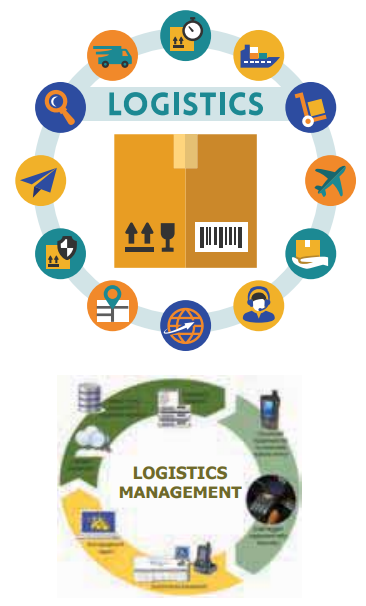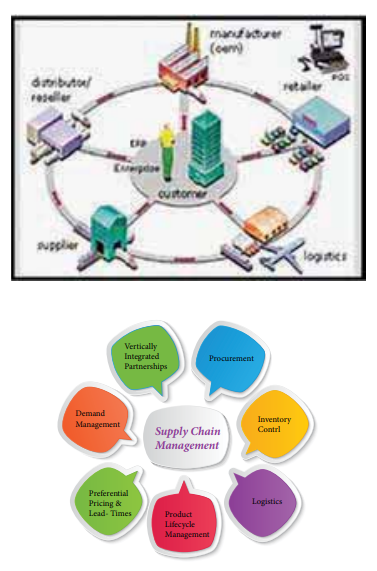Meaning, definition, Classification, Characteristics - Logistics | 11th Commerce : Chapter 16 : Emerging Service Business in India
Chapter: 11th Commerce : Chapter 16 : Emerging Service Business in India
Logistics
LOGISTICS
Meaning
Logistics can be viewed as a logical
extension of transportation and related areas to achieve an efficient and
effective goods distribution system.

Logistics Management is defined as ‘Design and operation of the physical, managerial, and informational systems needed to allow goods to overcome time and space (from the producer to the consumer)’. This implies that an integrated view of a number of different activities and functions may be required. These activities are represented as part of the value chain, called the generic value chain by Porter. All firms are viewed as a collection of primary and secondary activities.
Decisions
The logistics management involves
various decisions that need examination for an integrated system, they are:
Product design, Plant location, Choice of markets/sources, Production structure, Distribution/Dealer network design, Location of Warehouses, Plant Layout and Logistics, Allocation Design, Production Planning, Inventory Management – Stocking Levels, Transportation-mode Choice, Shipment Size and Routing Decisions, and Transport Contracting, Packaging, Materials Handling, Warehousing Operations.
Key Actors
Shippers (users of
logistics), Suppliers (of
logistics services) – Carriers (rail,
road, air, water, pipeline, rope-way), Warehouse Providers, Freight Forwarders,
Terminal Operators (ports, stevedores etc), Government (regulator of
logistics).
Organisations taking proactive
managerial attention in co ordinating the actors in logistics leads to reduced
logistics costs and improved customer service.
Role of Government
The government plays a significant role in logistics in India. The important legislations that affect logistics are Central Sales Tax and Local Sales Tax, Consignment Tax, Excise Duties, Octroi and Entry Tax, Use of Packaging Material, MODVAT, GST, Motor Vehicles Act and similar acts for other modes, Distribution of Policies.
Classification of Logistics Applications
The Logistics Management can be
classified on the basis of applications from various dimensions in the process
of examining and evaluating alternatives. They are 1. Decision-wise 2.
Actor-wise 3.Inbound logistics and Outbound logistics

Lements of Logistics Cost
The important elements of logistics cost
are
Product Inventory at source, Pipeline
Inventory, Product Inventory at Warehouses and Dealers, Transit
Losses/Insurance, Storage
Losses/Insurance, Handling and
Warehouse Operations, Packaging, Transportation, Customers’ Shopping.
Models in Logistics Management
The decision areas of Logistics can be
addressed using various quantitative models from Operations Research namely
i. Forecasting Models ii. Mathematical Programming Models – Location Models, Allocation Models, Distribution Network Design Models iii. Inventory Models iv. Routing Models v. Scheduling Models vi. Alternatives Analysis
Logistics and Infrastructure
Generally a good transportation,
storage, handling and information infrastructure helps in efficient logistics
management. In India most of the transportation happens through road and
rail. Pipeline and
Water transport are to be fully utilized further. Air transportation is
used for high value commodities.
In transportation infrastructure the following framework can be used to identify the problem areas
like Right of way, Vehicle, Motive power, Terminals, Operations/systems.
Logistics Management to Supply Chain Management
Logistics Management deals with the
efficient management of a static gap between demand and supply whereas Supply
Chain Management tries to identify the dynamic nature of the value
creation itself such
as responsiveness, quality and design. Hence, it aims for an effective
management response over the longer run.SCM focuses on profit maximization
rather than cost minimization. LM activity is supply driven and SCM is more
demand driven.
Related Topics